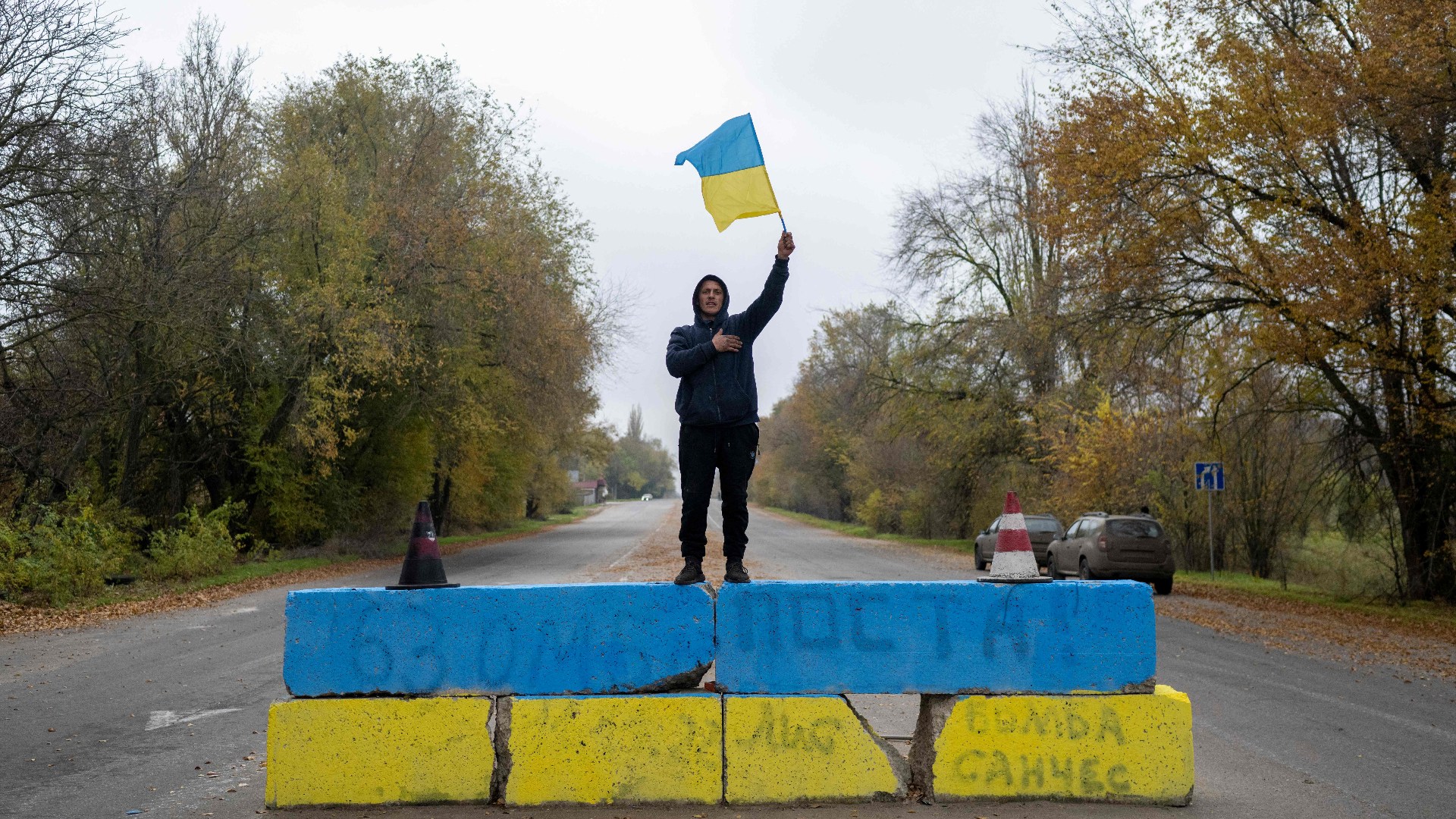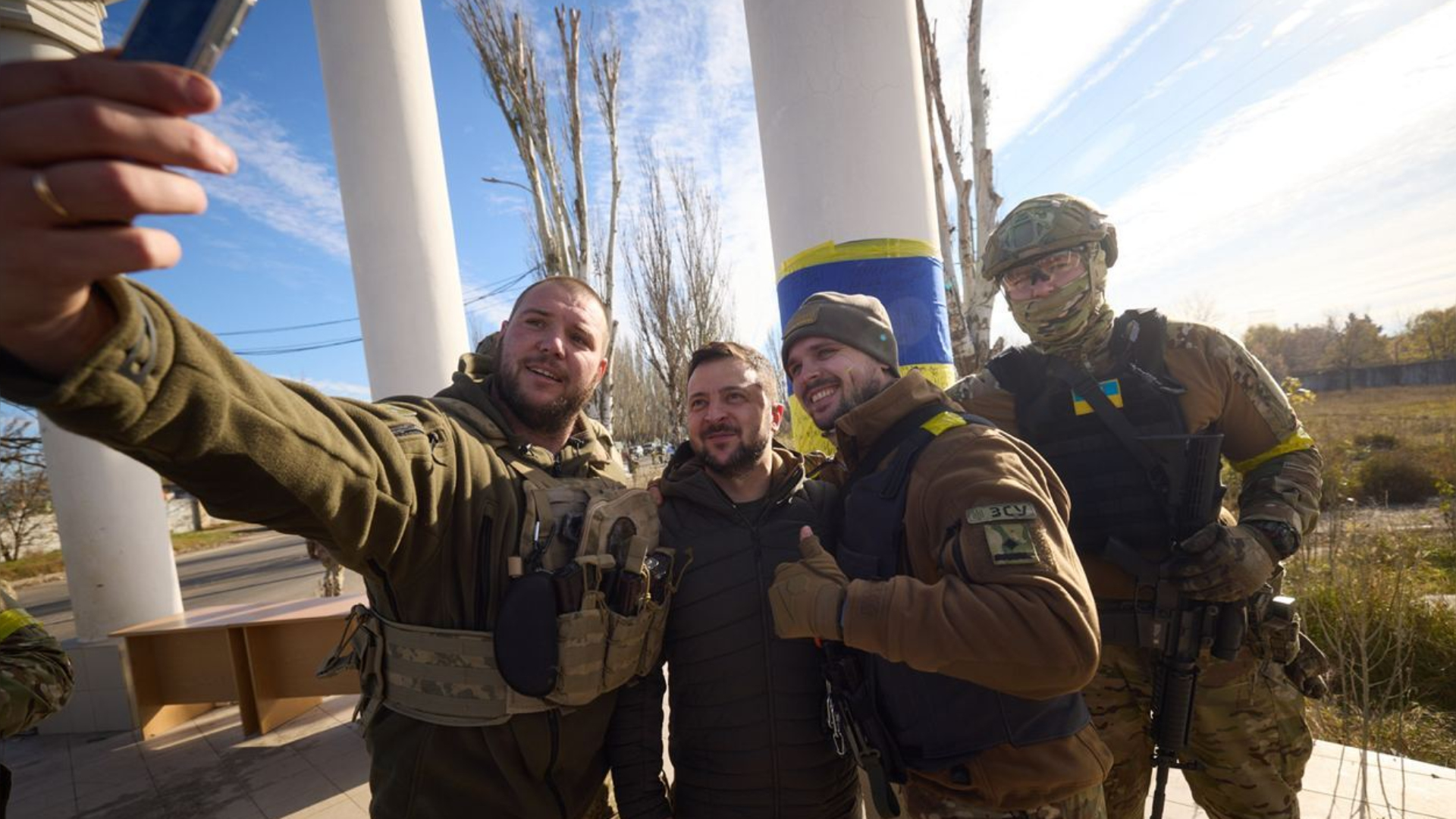In Kyiv, two days before the full-scale invasion on February 24, 2022, a Ukrainian military intelligence officer waved a printout at me, showing the detailed positions of Russian armoured units on the border. “We’ve actually located two Corps HQs,” he said. “What we can’t understand is why they would attack, because if they do it with the forces available, they can force us into negotiations but they cannot win.”
Two years later, that prediction has come to pass. Russia’s “three-day special military operation” stalled north of Kyiv, fell apart around Kharkiv, and was stopped by heroic resistance in the east. Only the breakout from Crimea succeeded, allowing the Russian army to take the Azov coastline and inflict destruction on the city of Mariupol. After that, through deft counter-offensives, Ukraine put the Russians to flight both on the Dnipro and in the east.
But its counter-offensive failed. And in the meantime, Vladimir Putin has survived a mutiny, mobilised the strategic depth of Russian industry, and now feels confident enough to assassinate opposition leader Alexei Navalny in an Arctic prison cell.
Ukraine’s options remain stark. Every Ukrainian I speak to knows: they could be defeated. If Volodymyr Zelensky were forced into a position where he had to sign territory over to Russia, that would destabilise Ukraine itself – creating a discontented country full of traumatised, armed men – and signal to the world that the solidarity of the west is worthless.
What have we learned about Ukraine in these two years? That its people want to be part of Europe, and are prepared to die in large numbers for that objective. That when facing existential peril, Generation Z is capable of generating solidarity and collaboration at unsuspected levels. That a society threatened by an ethno-nationalist aggressor can become and remain mobilised despite all the weariness, the trauma and the death.
But what have we learned about ourselves? Between the existential shock of February 2022 and today’s grim stasis, what has happened to western thinking – about diplomacy, the role of Europe, the scale of military mobilisation needed, and the technological arms race we are now in? And where do we go next?
The most obvious revelation is about America: its democracy has proved serially susceptible to Russian interference. When Tucker Carlson flies to Moscow to fawn over Putin; when Elon Musk acquiesces in the Russian use of his Starlink satellites; when Donald Trump warns that he will tell Putin to do “any damn thing he pleases” to Nato countries in eastern Europe, we are in a grotesque vaudeville whose final act could be the effective collapse of Nato by this time next year.
The next most obvious revelation is about the American people. It is clear that they no longer want the mantle of global leadership. Even if, by some stroke of luck, Biden wins the presidency again, his perpetual reticence is a reflection of the prevalent isolationism among US voters.
As for the rules-based international order, it is not dead but withering away into a half-life. The joint declaration of Putin and Xi Jinping, on February 4, 2022, declared the end of universal principles. In the future, they said, we will claim the power to define localised versions of democracy and human rights. Their supporters, a panoply of academic “realists”, claimed this was part of an inevitable shift towards a “multipolar world”, where the US, Europe, India, Russia and China would have to find collaborative ways to maintain order, via recognised spheres of influence.
What they forgot to supply was order. From Niger to Sudan to Yemen to Gaza to Ukraine itself, the joint gambit of Moscow and Beijing has produced only chaos; indeed chaos is its element.
As a result, those who still believe in the possibility of a treaty-based, universalist, multilateral system centred on the international rule of law have to be “idealists in a realist world”. We must cling to our determination to keep the human being, not the state, at the centre of international law; this was the great conquest of the 20th century, and won at the price of mass death. But we must also recognise that it is likely to be achieved through – metaphorically – reconquest. Sometime in the 2030s, there will have to be a moment of similar magnitude to the Universal Declaration in 1948, and we need to start preparing for it now.
What have we learned about ourselves, here in Britain, during the two years of high-intensity warfare?
The most bitter lesson has been learned by those, like me, on the left of politics. The British left, as George Orwell understood, has always been replete with dictator-worshipping fools, going right back to Sidney and Beatrice Webb and forward to George Galloway.
What none of us realised was just how many in that amiable mass of people who, over the years, have fellow-travelled for the left groups, the Morning Star, the Anti-Nazi League, the left trade union caucuses and Jeremy Corbyn would – when it came to it – give not one iota of shit about the fascist invasion of a European country.
The biggest Stop The War demo ever called over Ukraine drew 5,000 people, and was organised to rival the Ukrainian community’s demo outside Downing Street. Thereafter Corbyn toured Europe calling for governments to deprive Kyiv of arms and ammunition. At the moment I watched him do this in Madrid, with representatives of Sinn Féin, Syriza and the Podemos Party slapping his back, a friend serving in the Ukrainian territorial defence brigades sent me a photo of the machine gun he’d just been issued with. It was manufactured in 1944.
Many ordinary Brits, meanwhile, have responded with kindness. They have thrown open their granny flats and garden studios to refugees; taught them better English; organised singing sessions in village halls; bought pickup trucks, filled them with bandages and driven them thousands of kilometres to hand it all to Ukrainian troops.
But most Brits still don’t get it. What we’re facing is not an adversary that can be reasoned with; an evil that can be defeated simply by doing good; or a crisis that can be assuaged by meetings in the village hall. Though I refuse to use the dehumanising word “Orcs” to describe the Russian army, the great moral lesson Tolkien teaches us abides: in a time of monsters you have to kill the monster and bury the force that is animating it in a hole from which it cannot emerge.
And to do that, just as people in the defence world are having to learn real-time lessons about battle, we in politics have to start learning lessons about war. Because while armies fight battles, Ukraine shows us that it is societies that fight wars.
Ukraine’s survival, and the survival of the west, now depends on three kinds of strength: moral, physical and conceptual.
The officers I met in Kyiv, 48 hours before the war began, knew they had the moral force. They knew they had enough combat power to at least survive. But at the concept level they also knew their army was half-transformed: still adapting to western ways of fighting, still equipped with Soviet-era kit, still led by people who had worn the hammer and sickle on their cap badge.
Two years on, Ukraine’s moral strength endures. People are tired, Iryna Knyzhnik, a 46-year-old combat medic tells me. She switched from corporate administration to her present job in 2019, and rushed to the front on the first day of the war. Though the Ukrainian government does not release casualty figures, she leaves me in no doubt that they are high.
“I am afraid we need everything,” she tells me – while driving round London with a bullet-riddled ambulance she’s using to drum up aid: “More staff, ambulances, supplies, prosthetics and equipment for plastic surgery – because a lot of people have damaged faces. Oh and rehab, help with rehab.” By the time you read this, she will probably be back at the front with her tourniquets.
As for physical strength, Ukraine is now substantially dependent on the west. There are workshops where volunteers knock out hundreds of drones a week on 3D printers. But without western arms, Ukraine would be finished by Christmas – if Putin chose to make it so.
At the concept level, every Ukrainian soldier knows the answer to “how will we fight”. What they don’t know is how they will win. Because as the textbooks tell us: in a war, winning means removing the enemy’s will to fight and its means to fight. And nothing Ukraine has so far done has achieved that.
The challenge for the west is to mirror this learning process. A stark audit of our physical strength shows it is inadequate, should Putin roll over Ukraine and turn his attention to the Baltics. We need urgent and unashamed rearmament – and if that means borrowing money to pay for it then, as in the 1930s, we should do it.
At the concept level, sadly, few have any idea of how Putin could be defeated in a way that avoids chaos and collapse in Russia. The absence of the commitment to defeat him totally is the west’s great weakness. And at a moral level, especially in western Europe, still not enough people care.
So what I want politicians to do, here and across Europe, is to focus on the doable. Putin knows, because he was trained using the textbooks of Marxism, that in a war, the side with the strongest economy will win. His economy is stronger than Ukraine’s; Europe’s is 10 times stronger than Russia’s.
If we mobilise the economic power of Europe and north America, and sharpen it into the steady supply of arms and ammunition – including the hi-tech conventional weapons that could rid the Black Sea of Russian warships, and switch off Russia’s energy industry, Putin – or more likely those around him – will lose the means and the will to fight.
A war is not a crisis, to be managed by a specialist department of state while politicians get on with everything they came into politics to achieve. It consumes politics. It has to become the framework for everything else.
This is the transition British politics has yet to make. There is, across most parties and in the minds of most voters, the conviction that the Ukraine war will die back to its embers and eventually go away. But it will not – and through the posturing of Trump and his Republican supporters in Congress, to the antics of a figure like George Galloway in Rochdale – it is filtering into our reality whether we like it or not.
So on the second anniversary of the attack, I don’t want British politicians to declare they are with Ukraine for as long as it takes. That’s the easy bit. What I want to hear is: how much money they are going to borrow and spend to ensure Ukraine survives, how many drone factories they are going to open, how many shells and missiles they’re going to send.
It’s not going to be easy. But the alternative is not Ukraine’s defeat. It’s ours.




